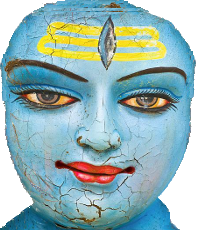Horse sacrifices

One of the rituals described in the Vedas is ashvamedha, the horse sacrifice. This was a political ritual and it concerned the king’s right to rule. First a horse, always a stallion, would be allowed to wander around freely for a year, accompanied by members of the king’s retinue. If the horse wandered off into the lands of an enemy, that territory had to be occupied by the king. Meanwhile any of the king’s rivals was free to challenge the horse’s attendants to a fight. If they did, and the horse was killed, the king would lose his right to rule. If, on the other hand, the horse still was alive after a year, it was taken back to the king’s court. Here it was bathed, anointed with butter, decorated with golden ornaments and then sacrificed. Once this ritual was completed the king was considered as the undisputed ruler of all the land the horse had covered. All kings in Vedic India performed the ashvamedha, and the ritual declined only in the latter part of the Gupta period.
Central Asia, not India, is where the horse originates and the ashvamedha is one piece of evidence which locates the Indo-Europeans outside of India. Horse sacrifices have been carried out all over the Eurasian landmass – in China, Iran, Armenia, among the Greeks and the Romans, even in Ireland. To the people of the steppe, the horse was a sacred animal, and horses were often buried together with dead kings. In the Irish ritual, the king had sexual intercourse with a mare who then was killed, dismembered and cooked in a cauldron in which the king proceeded to swim and drink from the broth.
New-age Hindu spiritualists have recently tried to revive the ashavamedha ritual, but they use a statue of a horse rather than an actual animal. In other contemporary rituals, live horses are worshiped rather than killed. Apparently devotion to the horse can help you defeat enemies and clear debts. The first critics of the ashavamedha appeared already among members of the Charvaka school of philosophy in the seventh century BCE. The Charvakas were skeptics and atheists. They had no doubt that horse sacrifices were invented by “buffons, knaves and demons.”
External links:
- All World Gayatri Pariwar
- Atlantis, “The horse sacrifice”
- History of India, "Vedic Period"
- James George Frazer, The Golden Bough
- John Andrew Boyle, “A Form of Horse Sacrifice amongst the 13th- and 14th-Century Mongols”
- Linda Kohanov, “The Tao of equus: a woman’s journey of healing & transformation through the way of the horse”
- The History Blog, “Horses, chariots, found in 3000-year-old burial”
- The Prehistory of Eastern Europe Part 1: Mesolithic, Neolithic and Copper Age Cultures in Russia and the Baltic Area
